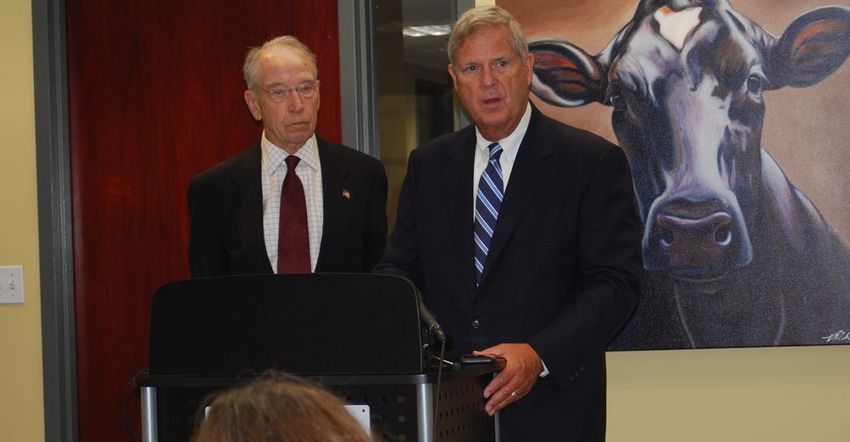September 11, 2019

Congress returned to Washington this week and passage of the new U.S.-Mexico-Canada Agreement should be at the top of its agenda. That’s the message a coalition of 79 Iowa businesses, organizations and ag groups sent Sept. 9 in a letter to Iowa’s congressional delegation.
During the August congressional recess, farmers met with Iowa’s two U.S. senators and four members of the U.S. House of Representatives at local events in Iowa to tell the lawmakers why this new trade agreement is needed. Congress needs to ratify USMCA to replace the 25-year-old North American Free Trade Agreement, say Iowa farm leaders. Over $10 billion worth of U.S. ag products are exported to neighbors Mexico and Canada each year, supporting 86,000 jobs.
“Modernizing and improving the U.S. trade relationship with Canada and Mexico is a bipartisan no-brainer,” said Iowa Corn Growers Association President Curt Mether. “A new trade agreement with Canada and Mexico could help calm the jitters of U.S. farmers who are facing tough financial times, due in part to President [Donald] Trump’s tariff war with China that has rocked our export markets.”
Passage important for Iowa
Iowa Farm Bureau has joined with the 79 Iowa businesses and organizations representing agriculture, small business, food companies, manufacturers, chambers of commerce and more to urge Congress to work together and pass USMCA.
“Here in Iowa, agriculture accounts for 1 out of every 5 jobs,” said Craig Hill, a Warren County farmer and IFB president. “Clearly, what we grow and raise here benefits not just farmers, but many other economic sectors in this state. Passing the USMCA is key to the sustainability of agriculture and many other businesses in Iowa.”
Hill adds, “No matter what ZIP code or job you have, Iowans want our elected representatives to remember we all live in a global economy and must be a part of it.
For Iowa farmers, the importance of USMCA is simple: The production from 1 out of every 3 acres of cropland is exported; 1 out of every 4 pigs is sent to markets outside our borders. That growth must continue if farming in Iowa is to remain sustainable, as farm exports make up a huge portion of farmers’ and ranchers’ income.”
USMCA builds on the success of the NAFTA agreement and will ultimately lead to freer markets and fairer trade, Hill said. “This is the time for our elected representatives to set partisan politics aside and choose to support all Iowans by passing USMCA.”
Farmers need positive news on trade
Two veteran Iowa political leaders teamed up and held a press conference in Des Moines recently and discussed the USMCA. Longtime U.S. Sen. Charles Grassley, along with former Iowa governor and U.S. Ag Secretary Tom Vilsack, met recently with media at Anderson Erickson Dairy. Grassley, a Republican, chairs the Senate Finance Committee. Vilsack, a Democrat, also called for quick passage of the retooled trade agreement with Canada and Mexico.
“This is an opportunity to emphasize there is bipartisan support for USMCA,” said Grassley, after he and Vilsack toured the AE dairy processing facility. “Passage of this new trade agreement needs to get done, and we will get it done.”
Vilsack, who now heads the U.S. Dairy Export Council, said passing USMCA is vital to provide an economic and psychological boost to the struggling U.S. farm economy. “There is a lot of financial pain in the countryside now, and ag is looking for a hopeful sign, a positive signal, and this new trade pact could help provide it,” he said.
The USMCA is an updated version of NAFTA, which went into effect in 1994. The new trade agreement would continue tariff-free trade between the three countries — the U.S., Canada and Mexico. It also addresses newer trade issues, such as digital commerce and intellectual property.
Pact needs to be approved this year
It’s important for Congress to pass USMCA before the end of 2019, Grassley and Vilsack said. Otherwise, the agreement could easily become tangled in presidential politics prior to the 2020 election.
Grassley, chairman of the Senate Finance Committee, is optimistic USMCA can make its way through Congress this year. “The debate on this trade agreement needs to begin now, as soon as Congress gavels into session,” he said.
Approval of USMCA would help U.S. dairy farmers who’ve been hit by low milk prices and negative margins, Vilsack said. “Exports are very important for dairy farmers, and trade agreements such as this one really matter.”
USMCA as currently written would solidify the market for U.S. dairy products in Mexico. Vilsack said it would also prevent the European Union and other competitors from capturing more of the world market share. It would allow U.S. dairy producers to continue using common names for various types of cheese, such as parmesan and mozzarella, which the EU wants restricted to using these names only for European cheese products.
USMCA supports off-farm jobs
“This issue is very important to the U.S. dairy industry and our farmers; we could lose a lot of market share if Mexico agrees with the EU that only the EU can use the cheese names,” Vilsack said. “However, if Mexico signs this USMCA agreement, then Mexico would have to follow the rules of the new trade agreement.”
USMCA would also help U.S. dairy farmers increase dairy product sales to Canada. Canada’s government has kept imports of dairy products from entering Canada, despite the existing NAFTA trade deal. Also, USMCA would penalize Canada for dumping milk powder on the world market, Vilsack said.
Both Grassley and Vilsack emphasized that USMCA will benefit all Iowans. “This trade agreement is as much about jobs as it is about farmers,” Vilsack said. “Ag trade supports millions of jobs off the farm.”
Since NAFTA first came into existence, U.S. ag exports have tripled to Canada and increased five times to Mexico. Mexico is now the top buyer of U.S. corn, purchasing 25% of U.S. corn exports.
Grassley and Vilsack said trade developments are important to farmers, manufacturers and rural America. Passing USMCA would help build momentum and reduce angst in areas of agriculture facing financial downturns, while other sectors of the U.S. economy thrive. “Exports matter and trade agreements are incredibly important to allowing the U.S. to have a level playing field with the rest of the world,” Vilsack told reporters.
Setting an example with USMCA
The trade disagreements, tariffs, intellectual property theft and related issues the U.S. has with China are far more complex and difficult than the issues related to getting Congress to approve USMCA.
“That’s particularly the case since the U.S. is approaching the issues alone regarding China, without the support of the global community,” said Tom Vilsack, former USDA secretary.
In a recent Wallaces Farmer interview, he said, “I don’t foresee the China trade disagreements getting resolved in the near term. That’s why it’s important for the USMCA trade agreement to be ratified and approved by Congress, to set an example, showing the U.S. is able to make progress in negotiations.”
Same goes for Japan. U.S. negotiators reached an agreement in principal with Japan on Aug. 24 that would cover areas of agriculture, digital trade and reduction of industrial tariffs. That agreement still needs to be finalized.
“If there is going to be an agreement on trade between the U.S. and Japan, having the USMCA approved by Congress sends the message to Japan that things are going to get better, and progress can be made on trade,” Vilsack said. “If USMCA doesn’t get ratified by Congress, and if an agreement isn’t reached with Japan, this is going to add to the worry and stress that’s already out there in farm country.”
U.S. Sen. Chuck Grassley is encouraged by the recent announcement of a preliminary trade agreement between the U.S. and Japan. “It helps us along the way by removing some of the anxiety agriculture has today — trade problems with China.”
About the Author(s)
You May Also Like






